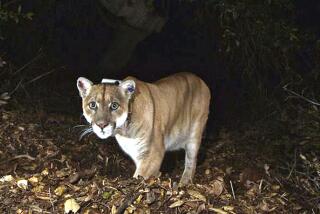Opinion: Time to stop poisoning mountain lions and other wildlife
Rats are unwelcome pests in our homes, offices and neighborhoods. But the powerful chemical pesticides that professional exterminators use to kill them cause some alarming collateral damage. They end up decimating the wildlife we want to thrive.
The California Legislature can step up in the next couple of days and put a stop to that.
There are a number of chemicals used to get rid of rats, but the most toxic and fastest-acting pesticides are second-generation anticoagulant rodenticides. Rats ingest the poison and bleed to death. The rat dies but the toxin in its system lives on to sicken or kill the animals that consume its carcass — and even the wildlife that eat the secondarily poisoned animals. That kind of pass-along poisoning has killed pets as well as eagles, owls, coyotes, bobcats and mountain lions, according to the California Department of Fish and Wildlife. In 2014, the state’s Department of Pesticide Regulation banned the sale and use of second-generation pesticides among consumers and restricted use to licensed commercial exterminators.
But that restriction hasn’t been enough to stop the spread of the pesticide into the wildlife ecosystem. Assembly Bill 1788, authored by Assemblyman Richard Bloom (D-Santa Monica), would prohibit the use of these deadly poisons statewide — with some reasonable exceptions — until the Department of Pesticide Regulation can come out with a definitive study of the effects of the poison. That study could take years. Mountain lions, which have been particularly hard hit by first- and second-generation rodenticides, need protection now.
Early this year, a male mountain lion known as P-76, which was being tracked in the National Park Service’s study of these animals, was found dead in the Santa Susana Mountains north of Highway 118. Recently released toxicology reports show a cocktail of chemicals in his system, including second-generation rodenticides. A female bobcat, also being tracked by researchers, was found dead in June in Agoura Hills with second-generation rodenticides in her system. Last year, the 3-year-old known as P-47, who at 150 pounds was one of the largest of the L.A. mountain lions being studied by the park service, was found dead with a blend of first- and second-generation poisons in his system. The Department of Fish and Wildlife found that 63 out of 68 dead mountain lions tested from 2015 to 2016 had second-generation poisons in their carcasses.
Meanwhile, with habitat encroachment, speeding automobiles and rat poison bedeviling the big cats, the fate of mountain lions in Southern California and along the central coast is already so tenuous that the California Fish and Game Commission voted in April to make the animals candidates for designation as a threatened species under the state’s Endangered Species Act.
Let’s stop poisoning them before they are any more imperiled.
The bill, which awaits a Senate vote, still allows the use of these second-generation pesticides in agricultural settings and in the event of a serious public health threat. It also allows the use of other rodenticides. If you have rats, there will still be plenty of ways to kill them or banish them from your homes. A version of this bill didn’t make it through the Legislature last year. Now, we need this kind of restriction even more. If we care at all about maintaining the wildlife that makes California such a wondrous blend of urban and wild, we have to do our part to protect it.
More to Read
A cure for the common opinion
Get thought-provoking perspectives with our weekly newsletter.
You may occasionally receive promotional content from the Los Angeles Times.











